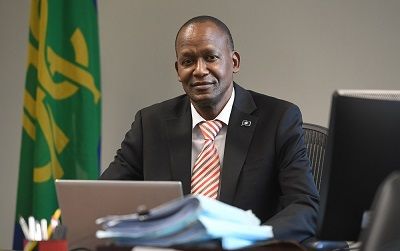Four members of the Alliance for African Partnership (AAP) – the Lilongwe University of Agriculture and Natural Resources (LUANAR), University of Pretoria (UP), University of Botswana (UB) and University of Dar re Salaam (UDSM) – have engaged the SADC secretariat for partnership in a number of areas of development for the region.
The delegation, which included LUANAR Vice Chancellor Prof. Emmanuel Kaunda, engaged the recently elected SADC Executive Secretary Elias Magosi to discuss collaboration.

The leaders sought the attention of SADC, in partnering with universities on research in seven areas including youth empowerment which is also the focus of SADC Chairperson, Malawi President Lazarus Chakwera.
In his remarks, Professor Kaunda said LUANAR is a Center of Excellence in a number of areas including aquaculture and fisheries which is recognised by the World Bank and yet has no significant recognition from the regional bloc.
“We have seen a little bit of disjoin there on how these centers can support the regional SADC agenda. Already we are offering PhDs and Master to students from 19 countries,” he emphasised.
This was echoed by Professor Swanepoel who represented UP, touching on the importance of collaboration as being key to regional integration.
Further, the universities want to work with SADC in areas of Human Capital Development, Centers of Excellence and Specialization, Policy dialogues, Gender, Science and Technology, Trade and Regional Integration and Engagement and empowerment of civil society organizations and other non-state actors,
According to Prof. Mkandawire, AAP Africa Director, who hosted the meeting, this is the first time a group of VCs has dated SADC and hoped that “this move will improve the way SADC works with universities.”
“Universities are key in human capital development for Africa through education and training. In addition, universities play a key role in the generation of knowledge through research, policy analysis and other types of analytical work,” he said.
Accordingly, said Mkandawire, VCs from SADC universities have joined efforts to deepen conversations with a focus on how institutions of higher learning can better contribute towards the advancement of SADC’s development frameworks.
In his immediate response, SADC ES, Magosi, said the meeting and the VCs' asks are “a very encouraging starting point” between the universities and SADC secretariat.
He noted the importance of Centers of Excellence as an important aspect to advance collaboration at a regional level suggesting a need to identify the available to build on and start others to close available gaps with focus on specific specialisation.
Among other calls, the VCs pointed out the need to define mechanisms of engagement between SADC secretariat and institutions of Higher learning, Centers of Excellence, and research Institutes in the implementation of SADC’s Regional Indicative Strategic Development Plan (RISDP).
Further, VCs propose to engage with SADC on how expertise within the universities, Think Tanks and Centers of Excellence can be utilized to shed light on the impact of processes related to regional integration and the Africa Free Trade Agreement.
The leaders also want to work with SADC on a region wide program to develop the capacity of early career female researchers to initiate and manage research projects as well as communicate research to policy makers and broader audiences.